[Related article of the 9th Plenary Session]Related session: What is the mechanism to promote children's excitement and proactive behavior (3/7)
2020.02.05Inoue, Vice President CTO of LIVERNESS, who will speak at the session "What is the mechanism to promote children's excitement and proactive behavior?" on the second day of the 9th Annual Conference (March 7, 2020), has previously discussed with Yoshiki Ishikawa, a preventive medicine specialist.
[from "Education Support vol. 42 (June 2019)," "Report from the Center for Research in Liberace Education and Research"].
Create a spike of excitement!
When I was a child and saw an insect I had never seen before in the grass. The moment when you think you have solved a question you have been mulling over. The desire to know more, to wonder what is going on, and the desire and questions welling up from deep within. What is that "excitement" that drives people?
Yoshiki Ishikawa Preventive medicine physician✕ Kiyoshi Inoue Liberace Co.
Yoshiki Ishikawa Profile
D. from Jichi Medical University after graduating from the University of Tokyo School of Medicine with a Bachelor of Health Sciences and the Harvard School of Public Health. He conducts interdisciplinary research with companies and universities on the theme of "what it means for people to live better. His areas of expertise include preventive medicine, behavioral science, and computational creativity. He has given numerous lectures and appeared in magazines and on television.
Profile of Jo Inoue
One of the founding members of REVANES, he established REVANES with only undergraduate and graduate students of science and engineering while he was a graduate student. After completing his doctoral studies, he worked as an assistant professor and lecturer at the Department of Biological Sciences, Faculty of Science, Kitasato University, and as an assistant professor at the Graduate School of Medicine, Kyoto University, before being appointed and concurrently serving as a specially appointed associate professor at Keio University on August 1, 2015. While conducting research and development, he is responsible for launching joint research projects with universities and research institutions and supporting the establishment of research institutes.
Ability to ask "small questions."
Inoue.
I think every researcher has it. When you are doing an experiment, there is a moment when you suddenly connect with something you have been thinking about for a while, based on a past experience or an idea you had, and you think, "Oh my God, this is the phenomenon I was thinking about at that time.... At that moment, we are absorbed in an experiment to confirm it. In fiscal 2019, the Ministry of Economy, Trade and Industry's "Classroom of the Future," an initiative to experiment with new learning, demonstrated what that excitement is and what kind of mechanisms can trigger it.
Ishikawa (city)
I thought that the relationship between excitement and action overlapped with the power of athletes to keep going, which I had studied in the past. I interviewed many athletes to find out why they were able to continue to be active for so long.
Inoue.
That is interesting. What secrets did you have?
Ishikawa (city)
What emerged from that interview was that athletes convert their motivations for continuing to compete from internal to external motivations. They start out with internal motivations such as "I enjoy it" or "I want to be able to throw well," which then change to external motivations such as "I want to lead my team to victory" or "I want to make it to the Olympics. Then, in the middle of their career, they hit a wall. You reach your limit, that no matter how you do it, you can't improve your time any further or increase the distance. At that time, many people go through a phase where they encounter ideas from different fields other than sports and reassess themselves. That encounter leads them to ask, "Why am I doing this?" and found myself questioning myself once again.
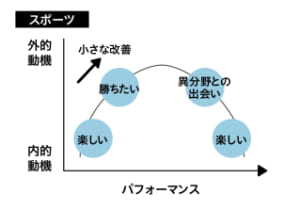
Inoue.
Athletes are also silently working toward a goal, trying to improve this part of their game, or practicing in this way, or continuing their efforts. A chain of actions is taking place, which certainly overlaps with the chain of actions where people are excited to experiment and investigate.
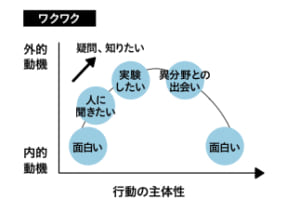
Ishikawa (city)
That's right. Another thing this research has revealed is that athletes continue to achieve "small improvements" in order to keep performing. The ultimate goal of a top athlete is to make it to the Olympics. But just setting such a big, distant goal will only leave you at a loss, and you will never get there. But those who have actually been able to get there have been asking themselves small questions on a daily basis and achieving them. They would ask themselves, "Couldn't I balance my body by slightly changing the angle of my right-hand swing?" "Wouldn't it increase my distance to swing a little later?" I would ask myself these questions in order to improve my performance. Then one day, one of the players told me that he realized that his next small step was to go to the Olympics.
Inoue.
That is similar to the process of a top-notch researcher doing all kinds of research and experiments to answer his/her own questions. Maybe we all start out thinking, "This is interesting! or "What's going on? and "What's going on? Then, they start researching in various places and listening to what others have to say about it. From there, we may want to pursue a larger theme. What if it were a child?
Ishikawa (city)
If we narrow the concept of excitement to intellectual curiosity, the child's excitement and the actions that come from it may be the very first place where this line begins. It is interesting! This is the state of being when you are kneading things together with the thought, "This is interesting! When I was in elementary school, I learned from my teacher how to divide a corner into two equal parts using a ruler and compass, and I was told that it had been proven that the same method could not be used to divide a corner into three equal parts. For some reason, I felt that I could do it, so I spent the entire summer vacation searching for a way to divide the square into thirds. (I kept looking for a way to divide it into thirds! (laughs). Then I finally realized that I had done it the wrong way and that I could not do it after all.
Inoue.
This is exactly how children continue to act out of the questions that arise and their desire to know more.
Notice, ask questions
Inoue.
Isn't it actually very difficult for athletes to ask questions that lead to small improvements? In the case of excitement, it is also important to notice something strange, to ask "Why? I think it is important for teachers and parents to guide them well in the beginning. Once the question arises, the desire to solve the question and the willingness to give it a try will arise, even though there may be some things they don't know how to do. That is why at LIVERNESS, with the catchphrase "turning the wonder of the familiar into interest," we have been offering experiment classes where students can learn the fun of science, how to formulate questions, and how to verify them through experience since the company was founded.
Ishikawa (city)
People interpret the same thing happening to them in very different ways. Children are no different. You can see this clearly when you observe them playing a card game. Some children change the way they play and keep playing. This is because they are able to change their own perspectives and ways of thinking. But children who can only see things one way soon get bored. In this light, if you can ask questions and notice, you can gain a lot from one environment. The element of excitement may be acquired from the very beginning.
Inoue.
We were all super excited when we were kids. Babies would put everything in their mouths to check things out. We were full of excitement. But as we grow up, we somehow lose that excitement. On the other hand, there are people like Mr. Ishikawa who have not lost it. Do you remember how your parents raised you when you were little?
Ishikawa (city)
I think it was perfectly normal, but I remember my father used to ask me questions and I would respond with, "What do you think?" I remember that my father used to ask me questions and I would respond with "What do you think?
Inoue.
After all, childhood environment may be important. But our other hypothesis is that excitement can be amplified. We believe that excitement is contagious. When teachers themselves are excited, it is contagious to their students. We also believe that we can increase students' excitement and encourage them to take action by what kind of questions we ask them and what kind of experiences we give them in class.
Ishikawa (city)
Excitement is definitely contagious. However, I also believe that the teacher can only provide the opportunity for the student to become aware of what is happening. No matter how many times someone tells you that something is interesting or mysterious, you may think you understand it at the moment, but often you cannot remember it. You may feel excited when you are told to be excited, but it is not the real thing. The excitement that moves people comes from within themselves.
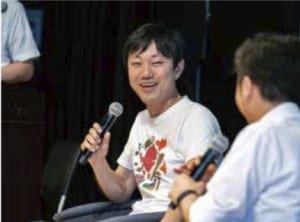
Change the phrase from "What is 00?" to "In 00."
Ishikawa (city)
When I learned "1 + 1 = 2" in school, I couldn't understand what it meant. I wondered what "+ (add)" meant. I didn't understand what "+ (add)" meant. What does it mean to "+ (add)" one apple and one apple? You can collect them, but what does it mean to add them? I was puzzled. I understood "- (subtract)" more easily. When you pull a bunch of oranges, they are separated from the original oranges. I thought that "- (subtract)" was the same thing. Because "+ (add)" was difficult for me, I wondered why we did addition first and then subtraction in school. I asked my teacher why. but she didn't give me any answer (laughs).
Inoue.
(Laughs) The teacher must have thought it was difficult to handle. But, to think about things from the beginning, or rather, to think about the event itself, is the same as the big question you ask in research. It is amazing that you have been doing this since elementary school.
Ishikawa (city)
The other day, I had the opportunity to give a lecture at a high school, and before I began to speak, the teacher gave the order, "Rise and bow! and all the students in the hall stood up in unison and bowed. I asked the teacher, "Why do you do 'stand up and bow'? I asked the teacher, "Why do you do that? I wondered why. As I recall, the teacher answered, "To unify the spirit of the students." I then asked, "What do you mean by 'unify the spirit'?" I asked, "What do you mean by unifying the spirit? What is that state? By thinking about that state, we might be able to find not only "stand up and bow," but perhaps another way to do it that is more optimal.
Inoue.
I think the teacher was troubled by that, too. It is customary to stand and bow at the beginning of lectures and classes.
Ishikawa (city)
I believe that this is exactly what is limiting the possibilities of various things. As I said at the lecture, I believe that as long as we remain in the mindset of "so and so," we will not be able to create new ideas and ways of thinking. Textbooks say, "This is what it says. This is what is considered "in" this field. If you stay in this way, new things will not be born. I believe that only by asking the question "What is" instead of "What is..." can you think for yourself.
Inoue.
Switching from "In ~" to "What is ~" is very straightforward. I think it is precisely the researcher who keeps thinking, "What is...? I think it is the researcher who keeps thinking "What is...? I think that "What is" is born from "What is...?
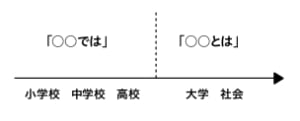
Ishikawa (city)
Of course. I think "˜is' is fine up to high school. Once you enter university or society, you have to shift to "˜what is' as you face academics. I remember when I took the entrance exam for the University of Tokyo, there was a question that asked, "Describe what youth is. I wrote "I don't know yet" on it (laughs).
Intellectual desire with proficiency
Ishikawa (city)
If we take excitement here as an intellectual desire, I think it will take time to be able to foster excitement on your own. I think you need basic academic skills, of course, and you also need to have a variety of experiences. Moreover, I also think that daily excitement can be low. At some point, there is a moment when you suddenly realize, "This is what this is all about! and there is a moment when the meaning is connected. I believe that this is what creates the excitement.
Inoue.
Wow, that's deep. I'm always excited too, but I still think there's a spike. I have spikes when I think, "This is it!" It's called an A-HA moment.
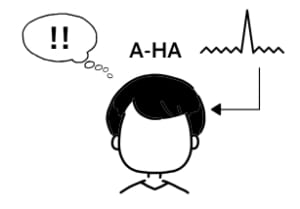
Ishikawa (city)
I like your expression of spike. I think excitement is both a spike and something that requires mastery. I think the most familiar state of the three is like a logarithmic function that is slowly increasing. It may increase quickly at first. And then you keep asking smaller and smaller questions, and it slowly keeps increasing.
Inoue.
Interesting! Keep making those spikes, and the accumulation of those spikes will become the Learn curve. That is the power of long-term, sustained pursuit. And if we think about the origin of that excitement, which is the main source of it, it is "ignorance (the state of not knowing scary, painful, or other unpleasant things)," and from the state of not knowing (the human default state), we must "act" to live, and to cause that action, energy ( Motivation) is indispensable. Then, the energy that people are born with may be "excitement. We will continue our research on excitement. Mr. Ishikawa, let's have another discussion! Thank you very much!
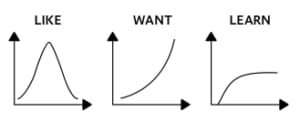
---------------------------------------------------
[from "Education Support vol. 42 (June 2019)," "Report from the Center for Research in Liberace Education and Research"].
To register for the 9th Annual Meeting of the Association for Hyperdifferential Studies, please contactClick here
Sessions related to education and excitement are
March 7, 13:00-14:00 What is the mechanism to promote children's excitement and proactive behavior @ Session Room B

